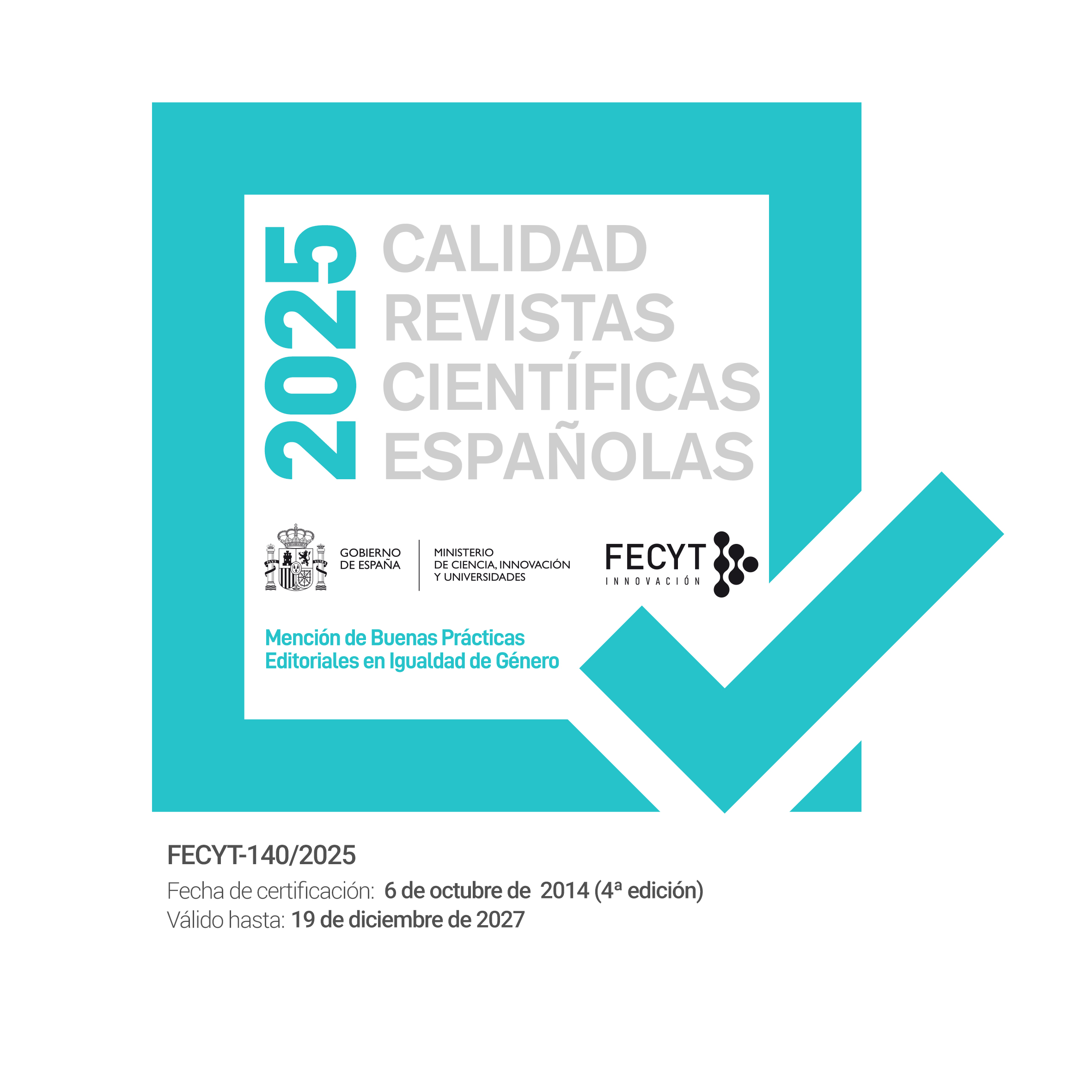Un análisis didáctico de la práctica docente en la enseñanza de la lectura del reloj analógico
DOI:
https://doi.org/10.5944/educxx1.23913Palabras clave:
Práctica pedagógica, enseñanza, tiempo, instrumento de medición del tiempo, MTSK.Resumen
La construcción del conocimiento especializado para enseñar el tiempo como magnitud es una actividad compleja que no ha sido estudiada en profundidad desde la práctica de manera previa. Este trabajo se plantea desde el análisis de la práctica de docentes en aula, relativa a las ideas de medición del tiempo.
Desde una metodología cualitativa se consideran tres momentos de la intervención del docente: para la práctica, en la práctica y sobre la práctica, entendidos como un ciclo reflexivo de investigación-acción. Para ello se han grabado sesiones de planificación e intervención en el aula de dos docentes de primaria, que se presentan y analizan desde las distintas categorías de uno de los modelos de conocimiento del docente de matemáticas, el Mathematics Teachers´ Specialised Knowledge (MTSK).
Los resultados muestran que en la planificación las docentes conocen la complejidad de tratar la lectura y registro del tiempo, siendo necesario enseñar a utilizar el reloj. Los hallazgos señalan la necesidad de apropiar a los estudiantes de los referentes de las unidades de tiempo y hacer énfasis en el funcionamiento del instrumento de medida, cuestionando la utilidad del reloj analógico.
Descargas
Citas
Adler, J., Ball, D., Krainer, K, Lin F.L., & Novotna, J. (2005). Reflections on an emerging field: Researching mathematics teacher education. Educational Studies in Mathematics, 60, 359-381.
1007/s10649-005-5072-6
Andrews, P., Carrillo, J., y Climent, N. (2005). Proyecto “METE” (Mathematics Education Traditions of Europe): el foco matemático. En A. Maz, B. Gómez, y M. Torralbo (eds). Investigación en Educación Matemática. IX Simposio de la SEIEM (pp. 131-137). Córdoba: Universidad
de Córdoba.
Beltrán-Pellicer, P., y Giacomone, B. (2018). Desarrollando la competencia de análisis y valoración de la idoneidad didáctica en un curso de posgrado mediante la discusión de la de una experiencia de enseñanza. REDIMAT, Journal of Research in Mathematics Education, 7(2), 111-133. 10.17583/
redimat.2018.2516
Boulton-Lewis, G., Wilss, L., & Mutch, S. (1997). Analysis of primary school children’s abilities and strategies for reading and recording time from analogue and digital clocks. Mathematics Education Research Journal, 9, 136-151. 10.1007/bf03217308
Burny, E., Valcke, M., & Desoete, A. (2012). Clock reading: An underestimated topic in children with mathematics difficulties. Journal of learning disabilities, 45(4), 351-360. 10.1177/0022219411407773
Carrillo, J., Climent, N., Montes, M., Contreras, L.C., Flores-Medrano, E., Escudero-Ávila, D., Vasco, D., Rojas, N., Flores, P., Aguilar-González, A., Ribeiro, M., & Muñoz-Catalán, M. (2018). The mathematics teacher’s specialised knowledge (MTSK) model. Research in Mathematics Education, 20(3), 236-253. 10.1080/14794802.2018.1479981
Chamorro, M. (2003). Didáctica de las Matemáticas. Madrid: Pearson-Prentice Hall.
Charles, R., Caldwell, J., Cavanagh, M., Chancellor, D., Copley, J., Crown, W… (2014a). Matemática 3° Educación Básica. Texto del estudiante [Texto
traducido y editado para el Ministerio de Educación]. Santiago de Chile, Chile: Pearson.
Charles, R., Caldwell, J., Cavanagh, M., Chancellor, D., Copley, J., Crown, W… (2014b). Matemática 3° Educación Básica. Cuaderno de ejercicios 4 [Texto traducido y editado para el Ministerio de Educación]. Santiago de Chile, Chile: Pearson.
Clements, D., & Sarama, J. (2009). Early childhood mathematics education research: Learning trajectories for young children. New York, USA: Routledge. 10.4324/9780203883785
Darling-Hammond, L., & Bransford, J. (2005). Preparing Teachers for a changing world. What teachers should learn and be able to do. San Francisco, USA: Jossey Bass. 10.5860/choice.43-1083
Earnest, D. (2017). Clock Work: How Tools for Time Mediate Problem Solving and Reveal Understanding. Journal for Research in Mathematics Education, 48 (2), 191-223. 10.5951/jresematheduc.48.2.0191
English, L.D., & Kirshner, D. (2016). Changing agendas in international research in mathematics education. In L.D. English, & D. Kirshner (Eds.), Handbook of international research in mathematics education (Third, pp. 3–18). New York, USA: Routledge. 10.4324/9780203448946
Erickson, F. (2006) Definition and analysis of data from videotape: some research procedures and their rationales. In J. Green, G. Camili, & P. Elmore (Eds.). Handbook of complementary methods in education research (pp. 177-191). Washington, D.C: American Educational Research Association. 10.4324/9780203874769
Fraisse, P. (1967). Psychologie du temps. Paris, France: PUF.
Friedman, W.J., & Laycock, F. (1989). Childrens Analog and Digital Clock Knowledge. Child Development, 60(2), 357-371. 10.2307/1130982
Friedman, W.J. (1990). About time: inventing the fourth dimension. Cambridge, MA, USA: MIT Press. Hargreaves, A., y Fullan, M. (2014).
Capital Profesional. Madrid: Morata. Hodkinson, A. (2004). Does the English Curriculum for History and its Schemes of Work effectively promote primary-aged children’s assimilation of the concepts of historical time? Some observations based on current research. Educational Research, 46(2), 99-117. 10.1080/0013188042000222403
Kamii, C., & Long, K. (2003). The measurement of time: Transitivity, unit iteration, and conservation of speed. In D.H. Clements & G. Bright (Eds.), Learning and teaching measurement (pp. 169–180). Reston, VA, USA: NCTM.
Killion, J., y Todnem, G. (1991) A process for personal theory building. Educational Leadership, 48 (6), 14-16.
König, J., Blömeke, S., y Kaiser, G. (2015). Early career mathematics teachers general pedagogical knowledge and skills: do teacher education, teaching experience, and working conditions make a difference? International Journal of Science and Mathematics Education, 13(2), 331–
10.1007/s10763-015-9618-5
Korthagen, F., Kessels, J., Koster, B., Lagerwerf, B., & Wubbels, T. (2001). Linking Practice and Theory. New York, USA: Routledge. 10.4324/9781410600523
Merriam, S.B. (1998). Qualitative research and case study applications in education. San Francisco, CA, USA: Jossey-Bass.
Monroe, E. E., Orme, M. P., & Erickson, L.B. (2002). Working cotton: toward an understanding of time. Teaching children mathematics, 8, 475-479.
NCTM (2000). Principles and standards for school mathematics. Reston, VA
USA: Author.
Piaget, J. (1971). La epistemología del tiempo. Buenos Aires, Argentina: El Ateneo.
Pirie, S. (1997). Chapter 11: Where Do We Go from Here? Journal for Research in Mathematics Education. Monograph, 9, 156-177. 10.2307/749953
Pizarro, N., Albarracín, L., y Gorgorió, N. (2018). Measurement estimation activities: The interpretation of Primary School teachers. Bolema: Boletim de Educação Matemática, 32(62), 1177-1197. 10.1590/1980-4415v32n62a21
Richie, D.M., & Bickhard, M.H. (1988). The ability to perceive duration: Its relation to the development of the logical concept of time. Developmental
Psychology, 24(3), 318-323. 10.1037//0012-1649.24.3.318
Russell, K.A., y Kamii, C. (2012). Children’s Judgments of Durations: A Modified Replication of Piaget’s Study. School Science and Mathematics, 112(8), 476-482. 10.1111/j.1949-8594.2012.00166.x
Sfard, A. (2005). What could be more practical than good research? On mutual relation between research and practice of mathematics education. Educational Studies in Mathematics, 58(3), 393–413.
1007/s10649-005-4818-5
Shulman, L. (1986). Those who understand: Knowledge growth in teaching. Educational Research, 15(2), 4-14. 10.2307/1175860
Shulman, L. (1987). Knowledge and Teaching: Foundations of the New Reform. Harvard Educational Review, 57(1), 1–22.
17763/haer.57.1.j463w79r56455411
Thomas, M., Clarke, D.M., McDonough, A., & Clarkson, P. (2016). Understanding time: A research based framework. In B. White, M. Chinnappan, & S. Trenholm (Eds.). Opening up mathematics education research. Proceedings of the 39th annual conference of the Mathematics Education Research Group of Australasia, (pp. 592-599). Adelaide, Australia: MERGA.
Van Steenbrugge, H., Valcke, M., & Desoete, A. (2010). Mathematics learning difficulties in primary education: teachers’ professional knowledge and the use of commercially available learning packages. Educational Studies, 36(1), 59-71. 10.1080/03055690903148639
Publicado
Cómo citar
Número
Sección
Licencia
Derechos de autor 2019 Educación XX1

Esta obra está bajo una licencia internacional Creative Commons Atribución-NoComercial 4.0.
La revista Educación XX1 se publica bajo licencia Creative Commons Reconocimiento-NoComerciaL 4.0 (CC BY-NC 4.0). Se permite la generación de obras derivadas siempre que no se haga un uso comercial. Tampoco se puede utilizar la obra original con finalidades comerciales.










